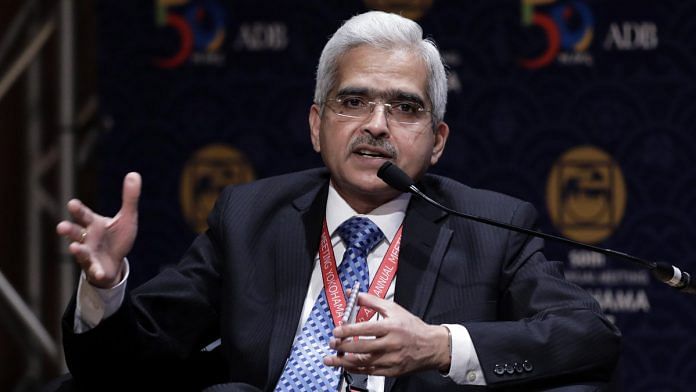New Delhi: It is imperative for banks to proactively raise capital as the compression in economic growth may lead to increase in non-performing assets for banks and consequently erode their capital, Reserve Bank of India (RBI) Governor Shaktikanta Das said Saturday.
To counter the increasing vulnerabilities, Das said banks have to focus on improving their governance and risk management and build capital buffers.
Speaking at State Bank of India (SBI)’s banking and economics e-conclave, Das said the pandemic is the biggest test of the robustness and resilience of the economic and financial system.
“The economic impact of the pandemic — due to lock-down and anticipated post lock-down compression in economic growth — may result in higher non-performing assets (NPAs) and capital erosion of banks. A recapitalisation plan for PSBs (public sector banks) and private banks (PVBs) has, therefore, become necessary,” Das said.
Also read: With fiscal deficit rocketing, Modi govt may have to go back to RBI for support: Economists
Medium-term outlook uncertain
The RBI governor pointed out that while the multi-pronged approach adopted by the central bank has provided a cushion from the immediate impact of the pandemic, the medium-term outlook remains uncertain and depends on the Covid-19 curve.
“Policy action for the medium-term would require a careful assessment of how the crisis unfolds. Building buffers and raising capital will be crucial not only to ensure credit flow but also to build resilience in the financial system,” Das said.
The RBI has asked banks and non-banking finance companies to conduct Covid stress tests, Das said, to gauge the impact of the pandemic on asset quality, profitability and capital adequacy. This will help banks in identifying their vulnerabilities and raise capital beforehand.
Das added that the minimum capital requirements as prescribed by the regulator may not be sufficient to absorb the losses on account of the pandemic.
“… Minimum capital requirements of banks, which are calibrated based on historical loss events, may no longer be considered sufficient enough to absorb the losses. Meeting the minimum capital requirement is necessary, but not a sufficient condition for financial stability,” he added.
Also read: Wuhan showed us how Covid could spread, now it offers clues to how economies may recover
Economy showing signs of coming back to normalcy
The Indian economy has started showing signs of coming back to normalcy after gradual easing of lockdown, Das said, but pointed out that it remains to be seen when supply chains will be restored fully and how long it will take for demand conditions to come back to normal or what will the durable effects the pandemic will leave behind on growth.
“The need of the hour is to restore confidence, preserve financial stability, revive growth and recover stronger,” Das said.
RBI is according equal priority to growth and financial stability, he added.
Orderly unwinding of measures needed
Das stressed on the orderly unwinding of the measures announced by the central bank to help different sectors of the economy to mitigate the effects of the pandemic.
“Post containment of Covid-19, a very careful trajectory has to be followed in orderly unwinding of counter-cyclical regulatory measures and the financial sector should return to normal functioning without relying on the regulatory relaxations as the new norm,” he said.
Das said that though the absolute success of the policy responses will be known only after some time, for now, they seem to have worked.
Since February this year, the RBI infused liquidity of nearly Rs 10 lakh crore in the system, equivalent to 4.7 per cent of 2019-20 nominal GDP, and cut rates by 115 basis points to counter the pandemic.
RBI is also using new tools and databases to strengthen its off site supervision of banks as the pandemic has disrupted the central bank’s onsite supervision, which included visiting banks offices and branches.
Also read: Over 1500 cooperative banks to be brought under RBI supervision




Plzzzzz sir I request u covi-19 RBI monetary policy during covid -19 pandemic
This is questioning sir replay me in Kannada
My name pavithra Srinivas I am now Stading BA 2nd year 4th Sem this question my assignment I now some but I want full work that sir